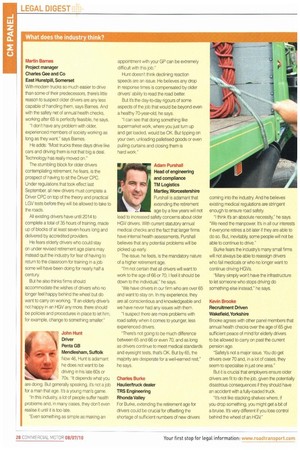Martin Barnes Project manager Charles Gee and Co East Hunstpill,
Page 28

If you've noticed an error in this article please click here to report it so we can fix it.
Somerset With modern trucks so much easier to drive than some of their predecessors, there's httle reason to suspect older drivers are any less capable of handling them, says Barnes. And with the safety net of annual health checks, working after 65 is perfectly feasible, he says.
"I don't have any problem with older, experienced members of society working as long as they want," says Barnes.
He adds: "Most trucks these days drive like cars and driving them is not that big a deal. Technology has really moved on."
The stumbling block for older drivers contemplating retirement, he fears. is the prospect of having to sit the Driver CPC. Under regulations that took effect last September. all new drivers must complete a Driver CPC on top of the theory and practical LGV tests before they will be allowed to take to the roads.
All existing drivers have until 2014 to complete a total of 35 hours of training, made up of blocks of at least seven hours long and delivered by accredited providers.
He fears elderly drivers who could stay on under revised retirement age plans may instead quit the industry for fear of having to return to the classroom for training in a job some will have been doing for nearly half a century.
But he also thinks firms should accommodate the wishes of drtvers who no longer feel happy behind the wheel but do want to carry on working. "If an elderly driver's not happy in an HGV any more, there should be policies and procedures in place to let him, for example, change to something smaller."




























































































































